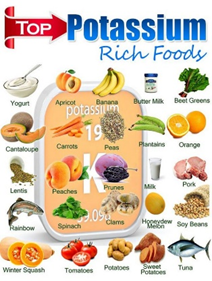Potassium-Rich Foods - You Need to Add To your Diet

The human body requires varying amounts of minerals daily to build strong bones and muscles. It also helps to maintain various bodily functions. Therefore, we obtain these nutrients from eating foods rich in minerals.
Potassium is one of the seven essential macrominerals. The human body needs potassium to support key processes. It helps maintain the water levels inside our cells. It is the third most found mineral in our body. It improves the circulation of fluids, nerve transmission, and muscle contraction control. Our cells contain almost 98 percent of the potassium in our body. The majority of this is present in our muscle tissue, and the remaining (20%) is found in our liver, bones, and red blood cells.
-
Controls nerve impulses and muscle contractions
-
Helps in maintaining fluid balance in the body.
-
Maintains proper functioning of muscle and nervous system.
Potassium also works as an electrolyte in our bodies. Electrolytes conduct electricity in the body and help manage crucial functions in the body. Between the positive and negative ions present in electrolytes, potassium helps carry positively charged ions.
Eating sufficient potassium helps in water retention, reducing blood pressure, preventing kidney stones, etc. In addition to this, our body is 60% made up of water, potassium helps manage the water present inside our cells. Hence, it is important to feed our bodies with enough potassium.

Some Foods to incorporate into our diet to increase potassium intake:
Spinach, Apples, Oranges, Tomatoes, Papaya, Bananas, Lemons, Celery, Mushrooms, Pecans, Raisins, Pineapple, Rice, Cucumbers, Strawberries, Figs, Brussels Sprouts, and Legumes
Bananas - Bananas are one of the most popular sources of potassium. Bananas are a great source of potassium and other nutrients such as vitamin B6, magnesium, vitamin C, manganese, and fibre. They also lower blood pressure, better asthma symptoms, better heart health and reduce the risks of developing type 2 diabetes. Bananas are a healthy source of fibre and help you feel fuller for longer.
Fish - Some fatty and lean fish can provide an adequate amount of potassium. Fish are also a great source of numerous minerals, such as zinc, iron, iodine, etc. It is also full of omega-3 fatty acids and vitamins B2 and D.
Watermelon - Watermelon is a great source of potassium as it has a very high water content. Watermelon is also a great source of magnesium, vitamin A, vitamin C, fibre, and other nutrients.
Spinach - Spinach is a popularly healthy vegetable. Although it is known to be a great source of iron, spinach also provides the body with enough potassium and other nutrients such as vitamin K, vitamin A, folate, and magnesium. It also has adequate amounts of potassium. Incorporating even a cup of spinach a few times a week can help you increase your potassium intake.
Legumes - Beans and legumes are other great sources of potassium. They provide ample proteins if you follow a plant-based diet. They are also extremely versatile.